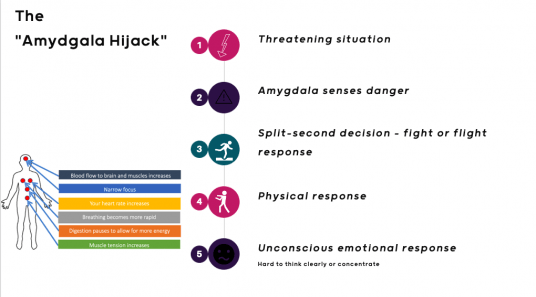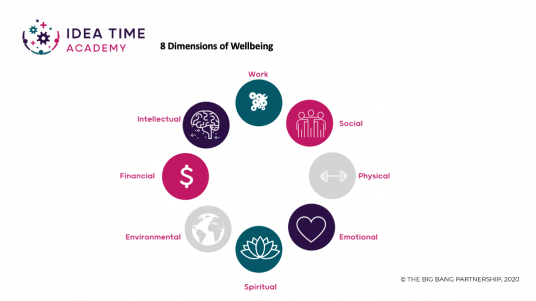Posted in Blog, Grow, Innovation, Lead, Self confidence by Jo North
This article is all about helping you to become the most resilient entrepreneur that you can be. It is packed with evidence-based tips and advice to help you weather whatever opportunities and challenges you and your business might face now and in the future.
How to be a resilient entrepreneur
To be a resilient entrepreneur:
- Develop a great understanding of what resilience actually means
- Don’t expect the past to be a predictor of the future
- Expect your business to have ups and downs – and work on how to deal with both
- Understand and manage your stress response
- Implement everyday strategies for supporting your resilience
- Recognise that you and your business are separate – don’t take things too personally
- Direct your attention and efforts on what you can control, not on what you can’t – that’s worrying, and it’s a waste of energy and imagination
- Focus on momentum, not perfection
- Don’t be afraid to say ‘no’ or ‘not now’
Read on to find out more, access free resources and get practical tips that you can put into action right now to build your resilience.

Why does being a resilient entrepreneur matter?
Building a business is packed with excitement, creativity, freedom and sense of achievement.
Being resilient in business is essential of you and your business are to succeed over the long term, with your mental and physical wellbeing remaining intact.
It can also be bloody hard graft at times, and things don’t always play out as well as we hoped. Couple the inherent challenges that come with being an entrepreneur who’s in the process of shaping and growing your company with occasional (or sustained) cash flow issues, and the hours often involved in winning new clients and looking after existing ones, and it’s no wonder that sometimes we can feel a bit frazzled at best, and downright stressed and knackered at others.
How resilient are you?
Taking steps to look after yourself and develop your emotional resilience can help you perform better at work and protect your health and wellbeing, which is an absolute must if you want to lead your business sustainably into the future, and enjoy the rewards of all your talent, creativity and hard work.
Worrying is a waste of energy and imagination
Some people think that they are natural worriers, or maybe even ‘stress heads’! But worrying is often an acquired or learned behaviour rather than a personality trait, and through awareness, self-development and practice, it’s likely that you will strengthen and improve your own emotional resilience as an entrepreneur.
In this article I’m sharing some strategies that have really helped me, and also my clients, to improve the way we live and work through really simple, small tweaks to help you avoid overwhelm in your business.
What is resilience?
Resilience is your bounce-back-ability, and ability to flex and adapt in times of challenge and change, all whilst maintaining a healthy mental outlook and sense of well-being.
As entrepreneurs, we are always going to have difficult days and challenges. Nothing runs smoothly in business. Being able to recover quickly is essential for our personal, and business, health and wellness.
And we feel more resilient at some times than we do at others, depending on how we are feeling, what is going on, and what we are working on.
Download your free Resilience Playbook here
Where does resilience come from?
Your resilience comes from a combination of your genetics, personal history, environment and situational context. To date, research, for example by Harvard expert Karestan Koenan, shows that the genetic contribution is relatively small. This means that we can develop resilience as a skill.
The book Man’s Search for Meaning recounts Viktor Frankl’s experiences in the concentration camps of World War Two, and how he developed his own resilience. He saw that the prisoners who were more likely to survive the concentration camps had specific psychological methods of resilience: rich inner lives, future-oriented goals, and discovery of meaning in their suffering. There are indeed lessons from such extreme circumstances that we can apply in our everyday lives to build our own resilience.
The stress response – what happens to our brains and bodies when the going gets tough
Stress is a feeling that most people can relate to. The ‘stress response’ is a term that is used to describe what happens to our brains and bodies when the going gets tough. This can also be referred to as the ‘fight or flight’ response.

This is the emergency reaction system of our body. It’s called an amygdala hijack. The stress response includes a number of different mental and physical responses to your perception of different situations.
Your body may release cortisol, adrenaline, and other substances when the stress response is turned on. Our organs are programmed to react in specific ways when situations arise that are viewed as threatening and challenging.
Stress is also very individual – what one person finds stressful, another person may not.
Slowing down and breathing well – especially a long exhale through the mouth – can help to curtail an amygdala hijack when it happens.
My personal story
Working at full pelt, taking risks and really pushing yourself may be exciting, but do it in a sustained way over a long period and it will take its toll. We’re humans, not machines.
A few years ago, I was working on a major, high profile corporate project with lots of international travel, marathon training and studying for me PhD, all at the same time. It was the tip of the iceberg in terms of my achievement drive and love for the work I do. But I found that however hard and long I exercised, and however little I ate, losing weight was painful and slow, and I also felt completely awful at weekends. On weekdays, though, when I was on the go, I felt fine!
After loads of medical tests I found out that I had severe adrenal fatigue, and that my basal metabolic rate had become roughly half that of a woman my age, height and weight as a very likely result of that adrenal fatigue.
I’m now feeling full of beans again, and that was a few years ago, but it was so hard at the time and also it took a while to put right. My metabolism still isn’t where it needs to be, but at least I feel good and my weight is a work-in-progress.

How to build resilience as an entrepreneur
Everyday strategies
Building in everyday strategies for supporting your resilience is good for health and wellbeing, as well as preventing an accumulation of stress.
I’m not a physician or nutritionist, but the tips here have really helped me. They can seem like a false economy when you feel like you need to work super-hard just to stand still, but making the investment in looking after yourself is THE best thing you can do.

Here are some simple but powerful approaches that are pretty easy to build into your routine, however busy you are.
1. Look after your physical health
Physical health is always a work in progress for me, as you will understand from the personal story I’ve shared above.
Doing what you can to take care of your physical health creates a positive foundation for your wellbeing overall, as well as for your emotional resilience.
- Get enough sleep. Stress can often make it difficult to get to sleep, and to experience deep, relaxing sleep. Getting enough sleep can help you feel more able to deal with difficult situations and keep challenges in perspective.
Limit caffeine and sugar after lunchtime, set a curfew for work and screen time to top well ahead of your bedtime, and build a routine for good sleep hygiene. Did you know that the NHS has recommends some apps to help you get to sleep? Have a look at the Sleepstation website for more great advice and articles on sleep.
- Be active. Getting outside, especially in nature, is proven to improve mood and support physical and mental wellbeing. If you can’t get outside, keep moving in any way you can. I make sure I get plenty of walking in – it really does clear my head and make me feel better.
2. Start the day on your terms
This one makes a surprisingly big difference for something so straightforward.
Do you feel tired in the mornings, so press the snooze button repeatedly and then get up at the last minute and rush round the house to get out the door?
Or do you jump out of the bed as soon as the alarm goes off, have time to do something just for you, such as stretching, journaling, exercise, meditation, before getting ready and starting the day on your terms, feeling in control?
Starting the day mindfully makes a big difference to your creativity and entrepreneurial performance at work.
It may take a little time to get into a new routine if you’re a snoozer, but making sure that you begin every new day feeling good is super-effective at helping the rest of your day go well too, especially if you include a bit of time to plan your priorities for the day.
If this is something you’d like to explore further, you might like to explore Hal Elrod’s best-selling book, The Miracle Morning.

3. Look at life and business from 30,000 feet
From time to time step back and zoom right out of the day-to-day to look back into how your living your life and managing your business from 30,000 feet.
How does the big picture seem to you?
Are you making time for family, friends, fun and health, as well as work?
4. Focus on productivity, and prioritize
Before they started working with me, some of my clients were working really long hours, with the business significantly eating into their family and leisure time.
Business growth usually takes significant work and commitment but working flat out is neither necessary nor productive. In fact, it can hamper growth because when we are so busy, we can’t see the woods for the trees, and our judgement and decision-making can be a bit off.
Here are some easy things you can do to make a positive difference to how you feel.
- Create a high-level schedule for each week, and adjust it each day if necessary, and make sure you prioritise the things that really matter and that make a meaningful difference to moving you forward.
- Identify the low value tasks you’re doing and get rid of them where you can, by either delegating, minimising or stopping them.
- Work with your natural energy levels and identify which times of day best suit the type of work you need to do. For instance, I notice that clarity and creativity are much easier for me very early in the morning, so I try to schedule new projects, writing and facilitation design in then. I do lower level tasks when I’m likely to be feeling more tired or less switched on. As far as you can, create days that are varied and interesting as much.
- Build in frequent, short breaks throughout the day. A five-minute walk around the block, stepping away from your phone and computer and taking five for a cuppa away from your desk, a few light stretches at regular intervals improve productivity and help to maintain energy and positivity. Combining a quick break with topping up on water also helps you stay hydrated at the same time.
- Focus on momentum, not perfection. As you know, I’m a big believer in defining and then shooting for big, hairy, audacious business goals. But you don’t have to get there overnight, and progress towards them is more important than perfection. Break your big goals into smaller steps, and aim to do something, however small, towards the goal every day. Congratulate yourself for the progress you’re making instead of putting yourself under pressure to achieve overly ambitious targets.
- Make sure your business plan is realistic and achievable. Have a look at my guide to creating an innovation strategy for your business here.
- Be kind to yourself. What I have noticed is that so many entrepreneurs – including (and almost especially!) really capable and successful people – have times when they are grappling with low self-belief and confidence in what they are doing. It’s rarely visible to the naked eye, and only surfaces in safe spaces such as our one-to-one coaching conversations.
Outwardly super confident people don’t always actually feel so self-assured inside sometimes, of course. Most of us have wobbles, and then we bring ourselves round. For a surprising number of people, though, the self-doubt doesn’t seem to completely subside for a while sometimes, and it can hold them back from making some of the bolder decisions that could really propel themselves, and their business, forward.
If your inner critic stops you from believing in yourself and moving forward, you will find the tips and advice in my article here on confident decision-making, really useful.
- Don’t be afraid to say no, or ‘not now’. There’s a saying, isn’t there, that every time we say ‘yes’ to something, by definition we say ‘no’ to something else. Taking on too much is a big contributor to overwhelm, and also means that we are more likely to drop the ball and make mistakes, creating additional problems.
Contrary to what many people believe, it’s not true that the best way to keep a client is never to say ‘no’ to them. Many customers respect honesty and integrity, and as long as you empathise, say no as early as possible, explain clearly and suggest an alternative solution or a time when you can do the work, many customers will try to work with you on that if they can.
If customers are inappropriately demanding, it’s worth considering whether they are the sort of clients you should be working in the longer term anyway.
- Ask for help with tasks that contribute to you feeling stressed. For example, a number of high-performing entrepreneurs that I work with get stressed even thinking about cashflow, never mind managing it and dealing with any issues. If this resonates with you, listen to the I Hate Numbers podcast for some great advice on how to get to grips with the financial side of your business through super-accessible tips and advice.
There are heaps of time-saving tips and tools in my free Productivity for Innovators download, and also in my other articles 20 Productivity Hacks and Time Management Tools and Personal Productivity Hacks for Busy Business People.
5. Take proper time off
Please do build in some weekends, breaks and holidays when you can take some real time off to regenerate and re-energise. Take your phone and laptop with you if you must, but if you do, ration your work time to quick check ins to reassure yourself that all is well back at work so that you can relax.
6. Surround yourself with positive and realistic people, and stay away from drama
The people we spend most of our time with influence us in many ways, and it’s been shown that the five people we are closest to are crucial to our success. Think about who you spend most of your time with at work and think about how they affect you. Also think about anyone who continuously brings unnecessary drama with them on a regular basis, and, if you can, reduce your exposure to them as much as possible.
Build a mutual support network of ‘business besties’ outside your business too, with everyone helping each other to succeed in their own respective companies.
7. Replace the word ‘failure’ with the word ‘learning’
Getting it right first time is a great aspiration, and there’s nothing wrong with that in principle.
The challenge is that, by definition, when we are innovating in business we are working on commercialising something that hasn’t been done before.
We can use data and analysis, look at what has happened elsewhere and the rest of it, but if we are doing something new it’s rare that we can predict with complete accuracy how the market will respond, and how well our ideas will work in practice.
So being comfortable with failure (I prefer to replace the word “failure” with “learning”) is essential if you want to become a more resilient entrepreneur, especially in our fast-changing and uncertain business environment.
8. Remember your mission – and dare to be different
No one said it would be easy, and you started your business for a reason. You had a mission. Continue in line with your purpose, dare to be different, adjusting your course as necessary on the way.
When what we are working towards aligns with our core purpose, it helps us to overcome adversity and not quit when the going gets tough.
9. Know when to quit
All that said, there does come a time when the right and best thing to do really is to quit your business idea – or at least put in hold for a while.
There’s no shame in that, and better to do so at the right time so that you can move on than to hang onto something that’s really not working for you.
It’s a judgement call whether it’s time to quit or not. Trust your own judgement, use your entrepreneurial intuition and do what’s right for you.
So, what next?
I hope that you have found this article useful and that it’s given you some fresh insight and tips that you can use to build your resilience as an entrepreneur, and to look after yourself as well as your business.
Resilience can be considered a skill that you strengthen through awareness, great habits and and self-development.
If you would like more resources and some one-to-one confidential, individually tailored coaching, consultancy and resources to help you grow your resilience and you’re your business, do get in touch. Just pop your details into the contact form below.




